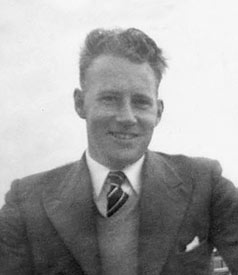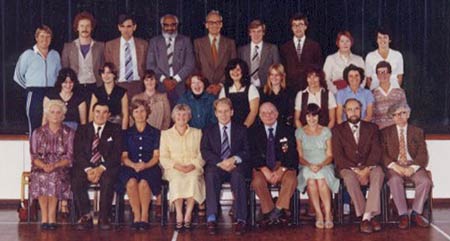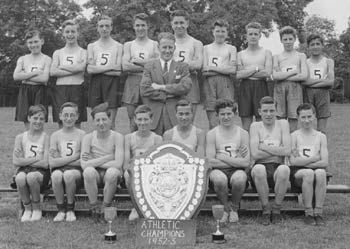
Of all the teachers we encountered in our time at Downhills, Geoff would be the
one we were sure to remember, such was the impression he made. He did not go out of his
way to court popularity; he saw his role as making sure we got our GCE in Mathematics
and he worked us hard as a consequence. It was a long time later, when the success of
achieving those qualifications was a distant memory, that we appreciated what a great
job he had done.
Below is a life history, written by his son, Steve.
My father was born and brought up in Tottenham, the youngest child of a family of 5.
The family was raised by my grandmother, who was the sole breadwinner. My father won
a scholarship to Tottenham Grammar School but times were hard and he left school
before taking formal examinations. He took a series of mainly manual jobs after
leaving school. The main one that I can recall was with the Singer Sewing Machine
Company. My mother says that he was given six promotions within six months but was
determined to join up with the armed forces as soon as he was old enough.
 Apparently
he made several under-age applications to the Army and the Navy, before finally being
accepted by the Royal Air Force. Apparently
he made several under-age applications to the Army and the Navy, before finally being
accepted by the Royal Air Force.
He entered the RAF towards the end of World War Two and had only just completed his
pilot and officer training when the war ended. He did not manage to fire a shot, or
drop a bomb in anger. When he was demobilised his commanding officer noted that he
had a talent for teaching (presumably as a result of observing him during briefing
sessions). This led him, despite the lack of formal qualifications, to apply for
teaching posts. After the war, teachers were in very short supply.
He taught briefly at Earlsmead Primary School from 1948-49, before joining Downhills.
In 1950 he left Downhills to take part in the Emergency Teacher Training Programme but
returned to the school, fully qualified in 1951. He mainly taught maths and geography
but, as a talented sportsman, also took a lot of PE and coached a number of school
teams in a variety of sports. He achieved several promotions during his time at the
school, eventually rising to the position of deputy headteacher.
He was very much a 'one school man', loyal to his school and his local area. When
Haringey Council adopted the comprehensive system in 1967, many schools were merged to
become larger, all-ability, schools. This happened to Downhills, which merged with
several other schools to become the William Forster Comprehensive School. When three
schools merge they bring with them three headteachers and any number of deputies -
some of them are bound to be unlucky in any reorganisation. All the senior managers
in all the borough's schools were encouraged to apply for posts in any of the new
schools that were being created. Geoff, however, applied only for a post at William
Forster, but was unsuccessful.
From 1967-1972 he taught mathematics at Drayton School in South Tottenham, although he
retained his protected deputy headteacher's salary. He remained convinced that the
LEA would, sooner or later, offer him a deputy headship when one became available.
In 1972, as he had predicted, he returned to William Forster, as deputy head. He
remained there until 1979 when he was appointed to the headship of William Fitt
Comprehensive in Waltham Forest (see picture below).

By 1979 (and indeed from well before that date) it was unusual for schools to appoint
senior managers who had not had experience in several schools. The usual route was to
stay for a few years and move on. It was even more unusual for non-graduate senior
managers to be appointed, let alone one who had no formal qualifications beyond a
post-war emergency training certificate. In many ways, however, my father's weaknesses
on paper were strengths in relation to the school and the locality in which
he worked.
I know that he was a very effective teacher (indeed he got me through my O level maths
after a nightmare mock result). As a self-taught mathematician, he was meticulous
about explaining each and every step in a calculation, making sure that the concepts
were fully understood before moving on. This attention to detail was reflected in
the planning of his lessons and the persistence with which he explained and
exemplified. Coming as he did from an underprivileged background, he was also
determined not to allow pupils' social circumstances and the low expectations of
others to get in the way of their progress. This helped him secure the loyalty of
his pupils, achieve excellent class discipline and to achieve results that were well
in excess of what might have been expected. He was very disappointed by some of the
changes that followed the creation of Comprehensive Schools.
 By the time of his appointment to headship, his health was in decline. The stresses of
headship accelerated the process. After only 5 years in post and following heart
problems he took early retirement in 1984. He died in 1992 after several further
relapses (and an entirely characteristic refusal to let a weak heart stand in the
way of an active life with his two young grandchildren).
By the time of his appointment to headship, his health was in decline. The stresses of
headship accelerated the process. After only 5 years in post and following heart
problems he took early retirement in 1984. He died in 1992 after several further
relapses (and an entirely characteristic refusal to let a weak heart stand in the
way of an active life with his two young grandchildren).
My father took great pride in the achievements of his pupils and remained in touch with
many of them long after he left teaching. I can understand why there would be many
former pupils who would be interested in what became of him. He would have been
equally interested to hear of them.
Geoff and Sport

Many Downhills pupils will remember him as a football, cricket, boxing and athletics
coach. I believe he also coached the Tottenham District Football teams for many
years. This interest in sport reflected his own talents as a sportsman - especially
as a footballer.
He played, mainly as winger or centre forward, for a variety of teams in the Southern
Amateur League, most notably Parkhill Athletic. Less well-known, however, was that
he played for several years for Barnet FC (at that time in the Athenian League).
More surprising still, to most, will be the half dozen or so games he played for
Tottenham Hotspur Reserves in the immediate post-war period. With many professional
footballers still abroad on active service, the Spurs often used talented local
footballers to fill their teams. I remember several ancient Spurs programmes (with
his name on) in the family scrapbook, alas now lost forever I suppose.
A keen cricketer, he played (at a lower standard than at football) for a number of local
clubs. He was captain of Highgate Cricket Club for many years from the late sixties
to the mid-seventies. He also played table tennis at club level until he was into his
fifties. In all sports he was a dogged competitor and an astute tactician, making up
for a lack of taught technique with a keen analytical sense and close observation of
his opponents. I offer these comments because I think that his qualities as a games
player were similar to those he used in the classroom. He used 'tactics' to motivate
and encourage his pupils to learn mathematics just as he would have done to help them
cross a football or swim front crawl.
Steve Rowe
|




 Apparently
he made several under-age applications to the Army and the Navy, before finally being
accepted by the Royal Air Force.
Apparently
he made several under-age applications to the Army and the Navy, before finally being
accepted by the Royal Air Force.
 By the time of his appointment to headship, his health was in decline. The stresses of
headship accelerated the process. After only 5 years in post and following heart
problems he took early retirement in 1984. He died in 1992 after several further
relapses (and an entirely characteristic refusal to let a weak heart stand in the
way of an active life with his two young grandchildren).
By the time of his appointment to headship, his health was in decline. The stresses of
headship accelerated the process. After only 5 years in post and following heart
problems he took early retirement in 1984. He died in 1992 after several further
relapses (and an entirely characteristic refusal to let a weak heart stand in the
way of an active life with his two young grandchildren).